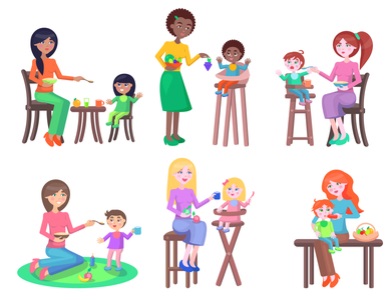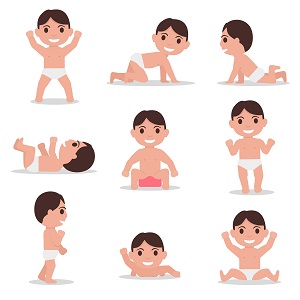JanuszKorczak, a legendary Polish pedagogue and writer, believed that “there are nochildren, only people.” There are two ways to interpret his words. Firstly, itmeans that children deserve the same respect we show adults. Secondly, asadults are different from each other, so are children.
To Matchthe Standard
Go on abusy day to a shopping centre, stop and look around – what can you see? Men andwomen from all walks of life. Some tall, others small, with various bodies,different complexion and behaviour. Some will sway while walking, others will marchas if on a parade, while that guy moves with a dancer’s fluid grace. You won’tsee two identical people.
Each ofthem was a child, once. And perhaps their parents also wondered whether theirson or daughter “matched the standards.” If they were “the same as otherchildren.” Whether they developed correctly, learning to sit and stand as afriend’s child did, or whether they ate the right amount of food, or learnedfast enough. Their progress was referenced with a model. However, the problemis – there is more than one model.

Betteror Worse does not Exist
Afterweighing and measuring, a baby’s data is compared to a growth chart. Do youknow how to read it? If the baby’s result falls at 50 percent, it means thatmore or less half of the children are neither much bigger nor much smaller thanyours. Similarly 97% of children are bigger than a child whose measurementsfill the 3rd centile. And the other way round – a child on the 97th centile isbigger than most other children. Are any ofthe results better than the rest? No. There is no better or worse. It is juststatistical data that helps to evaluate development. If over time a childremains in the same data brackets, everything is ok. If theysuddenly drop from 50 to 25, we should analyse what has happened.
Accordingto the Needs
Childrendiffer not only in weight and height. They have different reactions to stimuli,different muscular tension, and different appetites. A lot of these differencesare genetically determined. With scientific progress, for example the feedingrecommendations change, Strict guidelines or tables to follow are abandoned.The newest infant feeding recommendations clearly state that although it is theparents who decide what a child eats, the child decides if and how much they’lleat.
A child’sappetite is an important hint. We shouldn’t encourage a baby to eat,force-feed, play with them or confuse only to smuggle the next spoonful intotheir mouth. Children know whether they need that extra food or not. When theyclose their mouth and turn away, they’re giving a clear sign that they’re full.Forcing them to eat more than they need disturbs their metabolism and the waythey feel satiety. If we’re fighting now to make them eat more cereal, in a fewyears the same child may be a poor eater or suffer from obesity.

Theirown Speed
Theevaluation of development requires the same flexibility. There is plenty oftime for the child to learn how to roll, sit, crawl, get up, or walk. It’s awindow of opportunity, a period when most children acquire a new skill. Themore difficult a skill, the bigger the window. For example, children learn howto walk between the 10th and 18th month of life. Some learn this even beforetheir first birthday, others six months after that date. And it’s still withinthe standard.
Baby Steps
Childdevelopment specialists point out two important things. First of all, whenacquiring new skills it is important for children to continue making even smallprogress. Do they have the energy, curiosity, eagerness to practise new skills?Are they trying to reach for the toy we place juuust beyond their reach?Acquiring new motor skills is a very complex process. Before a baby startscrawling, they must practise rolling, head-lifting, reaching, pushing withlegs, coordination, spatial awareness… Small steps slowly take them tomilestones.

No Hurry
Secondly -do not hurry your child to acquire new skills. They must get there on theirown. That is why we do not sit a baby when they can’t do it themselves, or wedon’t help walk a baby that cannot stand. What we can and should do is providegood environment for development. Freedom of movement is important, too(comfortable clothes, opportunity for playing), as well as good surface forcrawling (non-slippery floor), the feeling of safety and parents somewherenearby (which is always fun!).
The Rightto Sensitivity
The factthat every child is different means that they have different reactions,behaviours, and needs. There are those who after birth quite quickly adapt tothe environment outside the mother’s womb, they are calm, don’t suffer fromcolic and fall asleep easily. But there are also infants who require more timeto adapt. They might find it easier to fall asleep with the help of the pink noseemitted by Whisbear the Humming Bear. The soothing hum produced by that aidreminds the baby the sounds they heard in their mother’s womb.
The BestVersion of Themselves
It isimportant to respond to the child’s individual needs. And it’s not aboutspoiling them. Quite the contrary. It’s about offering what is wise andreasonable for the child, about respecting their refusal and trying tounderstand their needs at the moment, and what they’re ready for. It’s easierto support a child’s development if we realize that they are unique, different froma neighbour’s son, or our niece, or other children of the same age. Comparingchildren is pointless, and it’s even more pointless to try to make themresemble someone they’re not. Let them be the best and the beloved version ofthemselves.













